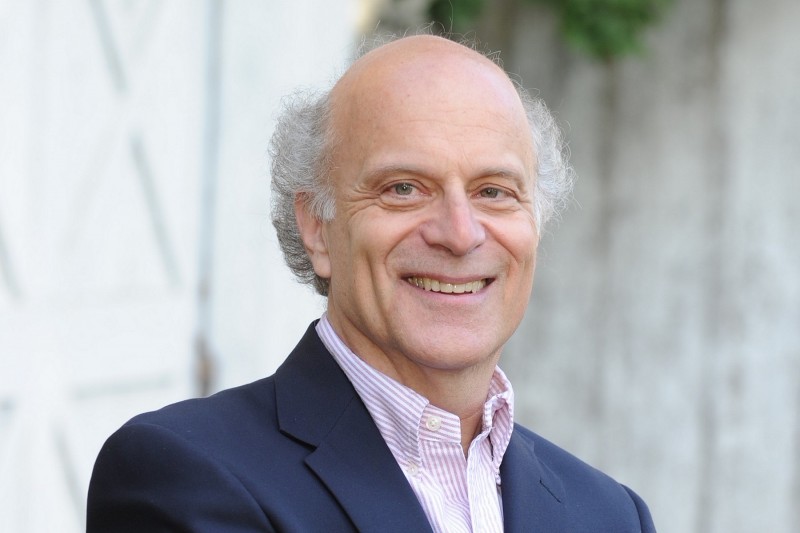Harvey J. Kaye / Historian
“The struggle has to be pursued to redeem the American promise, and Bernie understands that”
Álvaro Guzmán Bastida New York , 13/03/2020

Harvey J. Kaye.
Sean SimeEn CTXT podemos mantener nuestra radical independencia gracias a que las suscripciones suponen el 70% de los ingresos. No aceptamos “noticias” patrocinadas y apenas tenemos publicidad. Si puedes apoyarnos desde 3 euros mensuales, suscribete aquí
Harvey Kaye never lets his guard down. Over and over again, as though ventriloquized by Thomas Paine, the Wisconsinite historian reminds Americans of their radical democratic promise. He does so with torrential passion and a vivid sense of urgency. Hearing him talk offers a boost of erudite energy, rooted in the tradition of emancipatory struggles that vertebrate American history, going back to the time of the Revolution. Kaye is the author of numerous books, including, most recently, Take Hold of Our History: Make America Radical Again (Zero Books). He tweets regularly from @harveyjkaye. He hosts CTXT at his daughter’s house in Park Slope, Brooklyn, where he is visiting from Green Bay, to discuss Paine, FDR, Martin Luther King, and how the Bernie Sanders second presidential campaign fits into America’s longstanding socialist tradition.
Let’s talk about your efforts to reclaim an American tradition that’s often overlooked. We tend to think of American exceptionalism as something that’s tied to imperialism, to racism. It’s not a nice word to hear in other parts of the world. But you turn the concept on its head. What is the kind of American exceptionalism you’re interested in?
My American exceptionalism is rooted in Thomas Paine. If one looks at the revolutionary pamphlet Common Sense, what Paine recognizes after arriving from Britain is that America was already in rebellion in 1775. The Revolution was almost like an instinctive thing, that in the wake of what’s called the Boston Tea Party of December 1773, and Britain trying to impose direct rule and military occupation on Massachusetts, all the colonies rose up in a rebellion and threw out British authority. But they did so in the name of being British, they said: “We’re British subjects, we have the same rights as our cousins back in Britain.”
Whatever America’s going to become, it’s endowed by its founders with that kind of promise, radical democratic imperative and impulse which is expressed in the Declaration of Independence but goes far beyond it
It was almost as if there had been this anarchist revolution, and Americans were governing themselves by committees on the ground level of towns and cities, regulating commerce and political life. So Paine is utterly impressed. And he sets out to write a pamphlet in which he’s going to, in essence, hold a mirror up to Americans and say, “Don’t you realize who you are and what you’re doing?” What Paine says is that the cause of America is the cause of all mankind, that it was a struggle for freedom, equality, and democracy, which was universal. And he actually says, “We have it in our power to begin the world over again.” As Franklin Roosevelt said in 1932, “Economic laws are not made by nature, they’re made by humans.” And that’s Paine’s realization, that the things that are taken as inevitable and natural or divine are humanly created, and therefore we can literally start it all over again. And I think that at that moment, whatever America’s going to become, it’s endowed by its founders with that kind of promise, radical democratic imperative and impulse which is expressed in the Declaration of Independence but goes far beyond it.
To be dialectical for a minute, there’s also a -perhaps vulgar Marxist, reductionist analysis- that goes something like: Those founders you’re alluding to came with some limitations, not least their class position. One could say that a lot of the institutional strongholds on democracy in the US, including the Electoral College or the Senate and its unrepresentative nature, emerge from the fact that those people were slaveholders and merchants who wanted to protect their property rights. Are you ready to say that interpretation misses something?
Let me go back to the Revolution. Thomas Paine is recognizing the rebellion, a rebellion carried out by farmers and artisans, by indentured servants, and, indeed, by slaves. So the revolution begins in a rebellion from the bottom up. But the other thing is that what we call the founders, the signers of the Declaration, would never have done what they did if they had another way of doing it. When Paine’s pamphlet appears, all across the colony Americans are propelled into a sort of revolutionary republicanism.
Now, but what happens to that? Well, we end up some years later, in the Constitutional Convention, where the propertied class of America is seriously concerned about struggles from the bottom up which continued to emerge in American life, and create a new federal union in part to create an order of things, and to defend a certain kind of way of life that they enjoy themselves. And, to this day, they do everything they can to suppress Paine’s memory and control the memory of the revolution. But they can’t effectively fully do it. The struggles persist and the energies persist.
Your point is that the seed of American radicalism and even proto-socialism goes back to Paine and “Common Sense”.
Yes. Paine’s Common Sense and other pamphlets, which come to be embodied in some ways in the Declaration, literally turn Americans into radicals. And then in every generation there are movements of native-born and newly arrived Americans who in essence reach back to the revolution to validate their own struggle to secure life, liberty, and the pursuit of happiness, but also the idea of “We the people,” which is in the preamble to the Constitution, to enlarge the we the people and to enlarge the powers of the people. This includes, oddly enough, early Evangelical Christians advocating for the separation of Church and State, freethinkers, abolitionists, and feminists. In 1848, there was a women’s rights convention, in which a new declaration of independence was issued, called the Declaration of Sentiments, and they rewrote the declaration. So instead of saying “All men are created equal,” it says “All men and women are created equal.”
You argue that Paine also plays a big role in the abolition of slavery. In what ways?
When you get to the time of Lincoln, there are even presidents who are made into radicals by the American people. When Lincoln becomes president in 1860 and the southern states secede from the Union, Lincoln himself has already read Thomas Paine. He wants to sign an Emancipation Proclamation, but he can’t do it until he knows it’s going to work. Now, what makes him know it’s going to work? Slaves start moving off their plantations and running in tens of thousands to the Union lines, they want to work for the Union cause to fulfill their self-emancipation. So Lincoln then is empowered to sign the Emancipation Proclamation.
Then we come into the late 19th century and we’ve got labor unions, agrarian populists, urban progressives, socialists, anarchists. In the 20th century, as socialism is growing, we find the emergence of a small but decidedly active Communist Party. We have peace activists, civil rights activists like Martin Luther King... Every one of those movements reaches back and lays claim to the promise.
Your telling sounds like one of linear progress to full emancipation, or even socialism. But American modern history is one where the Right emerged triumphant. Even Paine’s famous quote was invoked by Ronald Reagan, among others. What happens to that vigorous tradition that you are describing?
Along the way, undeniably, there are setbacks. The propertied and the pious, religious conservatives and political conservatives, they like to declare the end of History over and over again. Their biggest fear of course is that democratic movements are going to redistribute property.
Reagan himself was originally a New Deal Democrat. Later he becomes a conservative. But he remembers the words that he was imbued with back in the ’30s and ’40s, and he literally turns them upside down, and he stands before the Republican convention of 1980, and he quotes three figures in his speech. This is fascinating: Thomas Paine, Abraham Lincoln, and Franklin Roosevelt, which shocked his fellow conservatives, because he was quoting three names who are historically progressive if not somewhat radical. And he quotes them in a truly radical fashion. Reagan realized that he wasn’t going to speak to his base in the Republican Party, he wanted to invoke all the heroes of working people who would have voted Democratic.
You brought up Martin Luther King. How does he feature into this struggle to redefine legacies? The version of his legacy that dominates mainstream public discourse seems particularly sanitized.
Much like Lincoln, who was something of a proto-social democrat, Martin Luther King is sanitized in a political way. He’s “the civil rights leader.” But King was a socialist, a democratic socialist. If one looks closely at his words, he was always making an effort to link the Civil Rights Movement and the labor movement. His most famous speech, the March on Washington speech in August of 1963, he’d already tried it out at a large labor rally in Detroit. And he also echoed FDR in calling for an economic bill of rights, which would enable the combating of poverty among people of color and among whites as well.
Martin Luther King was a democratic socialist. If one looks closely at his words, he was always making an effort to link the Civil Rights Movement and the labor movement
We see that sanitization at play with FDR as well. Now, Roosevelt never used the term social democracy, but it would be foolish not to recognize the degree to which he launches Social Security, the National Labor Relations Act, and a host of initiatives that are clearly in the social democratic tradition. So there’s this fundamental social democratic tradition that runs through American life, and it’s literally suppressed in American memory. People say “Oh, social democracy or democratic socialism is un-American.” But it’s fundamentally American.
You brought up FDR. His legacy seems to be a perfect example of that notion you alluded to of leaders being forced into becoming radicals. To what extent is that –the pressure from below— what explains a lot of the politics under FDR?
Washington, Lincoln, and FDR, as different as they are, there is something fundamentally similar in each case. It’s that push from the bottom up.
In the case of Franklin Roosevelt, the original New Deal was, in many ways, an effort to tame corporate capitalism and at the same time fight the Depression, create economic recovery, stimulus. But even in the very beginning, they build into the National Industrial Recovery Act a section to empower workers to organize and be able to bargain collectively. So the pressure was really building from the bottom up to push Roosevelt to act on some of the more radical ideas that he had spoken of. He then passed various important bills, including the Social Security Act. Capital was outraged. And in 1936 Roosevelt gives this really radical speech. In it he talks about “economic royalists,” and how much they hate him and they hate democracy. He says, “They accuse us of wanting to overturn American institutions. But what we really want to do is to overturn their power.” Now, that’s a very radical statement for a president to make.
So FDR had a vision, but it’s because of working people, working class pressure and organized pressure, that he goes further than he even imagined, but he’s very happy to do that. There’s a famous tale where a group of reformers come to visit Roosevelt, and they’re trying to get him to sign on to their initiative. And Roosevelt listens to them, and then he says “I agree with you, but you have to make me do it.” So that’s the kind of dialectic between Roosevelt and the people, a truly democratic dialectic.
When you compare that with the Obama presidency, was there any of that dialectic at play? Could you attribute Obama’s inability to deliver on a lot of his promise to that lack of popular pressure?
Well, I really spent a lot of time struggling with that question. I wrote a piece entitled “Obama Is No FDR.” Everyone thought in 2008 that we were about to elect a new Franklin Roosevelt. But there was a huge difference between these two figures. Barack Obama spoke of initiatives, and had that “Yes we can.” But when he became president, he turned his back on the very people that he enthused.
Some people say Obama just asked for too much of the American people. No, the fact is he didn’t ask for enough. He should have used what they call the bully pulpit of the presidency to call Americans out. Now, he failed to do that, and within six months of his becoming president, when they were trying to pursue the whole idea of a modest health care reform, the Tea Party emerges on the right. But he never really mobilized Americans to understand that this might actually be at least somewhat of a national healthcare. So he wasted a marvelous opportunity.
Some people say Obama just asked for too much of the American people. No, the fact is he didn’t ask for enough
When we were occupying the state capitol in Wisconsin, in what was called Wisconsin Rising, Obama had said when he ran for office that he would march with workers if they were out on strike. He didn’t even come to Wisconsin, he didn’t even give a speech supporting the struggle to hold onto workers’ rights, collective bargaining rights and union organizing rights for public employees. He turned his back on struggles. But it’s also the case that Americans, perhaps, shouldn’t have waited for Obama. They shouldn’t have waited. But the thing was that he had raised expectations and then deflated those.
The article you just referred to read “Obama Is No FDR.” Is Sanders an FDR?
Ever since the 1980s, I had said to myself, “If I could just vote for a guy like Bernie Sanders.” And now all of a sudden, in 2015, he’s running for president of the United States. Now, I was both agonizing for his victory and agonizing for him to actually speak like FDR, actually lay claim to FDR. And on one occasion, he did so. In November 2015, he recalls FDR, Lyndon Johnson, and Martin Luther King as a kind of democratic socialist tradition. But then he dropped it and went back on the campaign trail and spoke all the more of Scandinavian social democracy, Denmark and Norway, whatever. And it actually came to cost him, because Hillary Clinton said in a debate on national television, “We’re not Denmark.” I have nothing against Scandinavia, but if Bernie Sanders had spoken of the American social democratic condition, there’s no way she could have argued against that.
But then, this time around, however, he seems to have learned his lesson. FDR had the New Deal; Sanders talks about a Green New Deal. In the 1930s, FDR spoke of industrial democracy; Bernie Sanders now speaks of workplace democracy. In 1932, he spoke of an economic declaration of rights. In 1944, Roosevelt calls for an economic bill of rights. Bernie Sanders has talked about a 21st century economic bill of rights. So it’s a better Bernie Sanders. If you’re going to speak to Americans, you don’t want to talk to them about what others are doing, especially as they were doing what Americans themselves initiated. What you do want to talk about is the American radical social democratic tradition or the progressive tradition.
And the reason I say that is, to go back to my original argument, I think Americans carry this kind of democratic impulse inside of them. They all, in 2015-2016, surveys showed, they even used the word, Americans wanted radical change. You had two choices: Trump or Sanders. Clinton wasn’t radical change.
There’s something else about Sanders that goes beyond his references and his, turning back to this legacy that you’re describing so compellingly. You mentioned the bully pulpit. But he also refers also the need to mobilize in the streets not just in order to elect him, but in order to achieve structural change after he’s elected. What is that about? Did Roosevelt ever do that?
Roosevelt over and over again spoke invitingly to Americans, and even empowered them to organize. And in 1935, in that year when pressure was really building for him to pursue initiatives that he had spoken of but hadn’t yet signed into law, he gave a speech in which he said “Laws in themselves do not bring the new millennium.” Which was saying, in other words, you’re going to have to struggle for that.
So here’s Bernie, and his slogan is “Not me, us.” So he’s, of course, trying to mobilize people into a movement for the sake of getting elected president, but he’s made it very clear that in many ways, the mobilization will have to be all the more energetic if he is president, because of the opposition that he will face in Congress. And by the way, when Lyndon Johnson had decided it was imperative to enact Civil Rights and Voting Rights Act, he began to have regular meetings with Martin Luther King. And he said to King, “You have to stay in the streets, because I need that pressure to twist the arms and persuade those who would oppose these kinds of laws.” So smart leaders are not only leaders who have grand ideas, but they recognize the degree to which their grand ideas emanate from the American experience, and to make it happen they need the people to be pushing them to make them do it.
Bernie understands that. We don’t want a leader who’s going to just fight for us. We want a leader who will encourage the fight in us.
That brings up the question of “electability.” There is a sometimes good faith argument about the fact that yeah, Sanders will mobilize a lot of left-leaning people, but that doesn’t cut it, you need to win all these swing voters in swing states, and if the Democrats move too far to the left, you’ll get a second term by Trump, which is why they should run a centrist like Joe Biden. What do you say to that?
Okay, first of all, to speak historically, 45 years of class war from above, from both parties, created the circumstances in which Trump could win. But it didn’t have to be Trump. It could have been to the left. I mean, working people in this country have not really seen a significant rise in their wages in 45 years. So let’s not forget, if we vote someone who will appeal to so-called moderates, all that’s going to do is compound the situation. We’ve seen unbelievable inequality in this country, and if we get more of it, we’ll get somebody even worse than Trump in response. So I don’t buy the idea of we have to elect somebody who’s a moderate like Joe Biden in order to avoid the worst. Joe Biden could literally instigate even worse. Okay, but then let’s come back to the Sanders question. In 2016, I know Bernie Sanders could have beaten Donald Trump, because I’m in the state of Wisconsin that was one of the three states that enabled Trump to win, I can tell you, the Trump voter in many cases would have been a Sanders voter given the choice. Voters remembered what the Clintons, Bill in particular as president, did to Americans. NAFTA, mass incarceration, allowing commercial and investment banks to come together, which paved the way to the Great Recession, the end of aid to families with dependent children, which went all the way back to the FDR New Deal. So Bernie Sanders has a greater chance of appealing to those independent, nonpartisan voters, who were and still are looking for action.
One could read what happens in 2016 as follows: the Republicans were unable to stop their insurgent candidate, and the Democrats were really good at stopping their insurgent candidate. When you look at what happened in Iowa, how the way the entire party apparatus coalesced around Joe Biden at a critical moment later on, and a lot of the reporting on the media and even the way the debates are framed around fear of Sanders, what makes you think they won’t stop him now? Or that it’s even worth running within the Democratic Party?
Okay. Well, you have to run inside the Democratic Party. A third party will not work in the structure of this government and politics. But if it’s the case that it doesn’t work, it doesn’t mean it wasn’t worth trying. As E.P Thompson would say, “The consciousness emerges from the struggle.” So Bernie Sanders running has literally sort of reminded Americans of who they are, and if we don’t try, we will end up worse off. We will. And so the struggle has to be pursued, it just has to be pursued if we’re going to redeem the American promise, and I think Bernie understands that.
Trump is a vile figure, and in order to overcome him, we need to think about the most mortal crises in American history. Somehow, Americans, in spite of themselves, found it in themselves to pursue a revolution and create the makings of a democratic republic. In the face of a civil war that the South could quite well have won, because they had the military tradition that the North did not, it’s the case that to win the war, as Lincoln told Americans, “The world knows what we have to do, we know what we have to do, we must end slavery.” And Americans pursued a process of emancipation, bottom up and at the presidential level. So in other words, in the face of those two moments of crisis, the way Americans beat their enemies and transcend the crisis is to go radical. And then in the ’30s, the election of FDR, the pursuit of the New Deal, the empowerment of working people was a radical moment in American history, and then enabled the United States to be late to the war, but to enter the war and defeat fascism. So we’re in a crisis now. Trump is, if you like, the symbol of that crisis, but he’s not the cause of the crisis. The cause of the crisis is 45 years of corporate class war, conservative culture wars, and neoliberal political economy.
And lastly, because you’ve brought up FDR again, and fascism, and the ’30s: FDR talked about welcoming the hatred of his enemies, a phrase that Sanders recently invoked. Isn’t History full of examples of swaths of the middle class, of educated elites, choosing a form of fascism over even mild social democracy? And aren’t you afraid that that’s, to an extent, what we’re seeing in the US?
I’m not naïve about this. What gives me fear is the possibility that somehow we will not rise to the challenge as Americans did in the 1770s and the 1860s and the 1930s and ’40s. But what gives me hope is young people. They want Bernie Sanders. And look, the surprising thing is it’s not just the Republicans and the rich and the corporate elite who are worried about Bernie Sanders, it’s also even the so-called liberal media are doing their damnedest to belittle him. But in spite of that, young people couldn’t give a damn about the liberal media. They’re thinking about their futures, about the planet, about student debt.
So, yes! I am worried, I do have fears. And my fear is that Trump, because he won, literally brought out the strain that wasn’t a democratic imperative, that democratic impulse. He brought out that long standing strain of reaction. And he empowered that reaction, which means that to defeat that doesn’t require simply moderation and cooperation, it requires offering a vision beyond the crisis.
Harvey Kaye never lets his guard down. Over and over again, as though ventriloquized by Thomas Paine, the Wisconsinite historian reminds Americans of their radical democratic promise. He does so with torrential passion and a vivid sense of urgency. Hearing him talk offers a boost of erudite energy, rooted in the...
Autor >
Álvaro Guzmán Bastida
Nacido en Pamplona en plenos Sanfermines, ha vivido en Barcelona, Londres, Misuri, Carolina del Norte, Macondo, Buenos Aires y, ahora, Nueva York. Dicen que estudió dos másteres, de Periodismo y Política, en Columbia, que trabajó en Al Jazeera, y que tiene los pies planos. Escribe sobre política, economía, cultura y movimientos sociales, pero en realidad, solo le importa el resultado de Osasuna el domingo.
Suscríbete a CTXT
Orgullosas
de llegar tarde
a las últimas noticias
Gracias a tu suscripción podemos ejercer un periodismo público y en libertad.
¿Quieres suscribirte a CTXT por solo 6 euros al mes? Pulsa aquí







